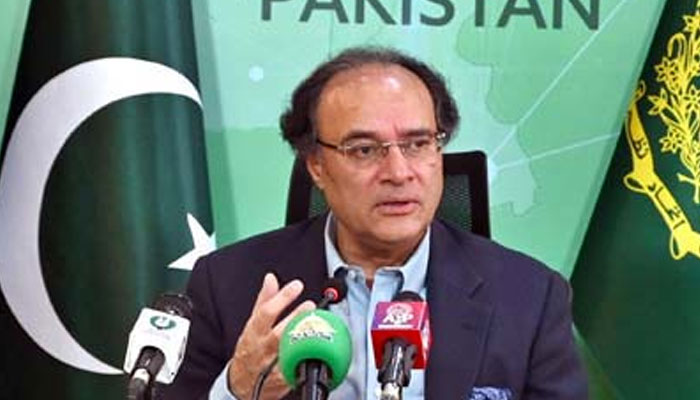IMF bailout linked with $12bn debt re-profiling by friendly countries, says finance minister
Minister says Pakistan seeks re-profiling of its $5bn and $4bn foreign deposits from Saudi Arabia and China, respectively
July 29, 2024

- Govt has already commenced process of re-profiling debt: minister.
- Says China has assured support for securing IMF's nod for new loan.
- Aurangzeb confirms govt seeking $600m loan from Chinese banks.
ISLAMABAD: Finance Minister Muhammad Aurangzeb said that the International Monetary Fund (IMF) Executive Board's approval of the staff-level agreement with Islamabad regarding a fresh bailout package is linked with $12 billion debt profiling by friendly countries, The News reported on Monday.
Speaking at a press conference in Islamabad, Aurangzeb said that the external financing gap was quite "manageable" and maintained that the government only seeks re-profiling of its foreign deposits of $12 billion, including $5 billion from Saudi Arabia, $4 billion from China and $3 billion from the United Arab Emirates (UAE) for a three to five-year period.
His remarks come as Prime Minister Shehbaz Sharif-led government reached a 37-month, $7 billion bailout programme with the Washington-based lender earlier this month.
The programme, however, is subject to the approval of the Fund's Executive Board — which the finance czar believes to come in in late August.
Commenting on the issue of debt related to Chinese Independent Power Producers (IPPs), Aurangzeb said that the government has already commenced the process of re-profiling the debt wherein it seeks extension in maturity and now a Chinese consultant would be hired to move towards achieving the desired objectives.
It is to be noted that the Chinese IPPs' outstanding repayment stood at $15.4 billion till 2036 and Pakistan was making requests for securing an extension in debt tenor of five to eight years period.
"There is a need to understand the very delicate issue carefully as Pakistan does not seek any debt restructuring or haircut but it has requested for an extension in the tenor of maturity of outstanding debt on account of both foreign deposits and Chinese IPPs debt," the minister remarked.
It is to be noted that Federal Minister for Energy (Power Division) Awais Leghari, during an interview with Geo News programme Naya Pakistan, said that they held detailed discussions on "re-profiling" of power sector debt with China.
His statement came after a high-level delegation — including him and the finance minister — concluded a visit to China, eyeing the re-profiling of the power sector debt in Pakistan.
Accentuating that Beijing has lauded Islamabad's efforts for taking tough decisions for clinching the IMF programme and has also reaffirmed its support for securing the Fund's approval, Aurangzeb noted that Pakistan would have to pursue both China and the United States simultaneously and separately as both blocs possessed importance for the country.
Noting that there would be nine Chinese IPPs, including one transmission line, and they could not go ahead with a knee-jerk approach, the finance czar announced that joint working groups would be established to create a win-win situation for both sides as it would be a long process for discussing with individual IPPs the issue of their rate on equity and dividend in detail.
Confirming that Islamabad was discussing a $600 million commercial loan from Chinese banks, he announced that the government would launch the Panda Bond whereby they intend to register $1 billion out of which $150 to $200 million would be capitalised in the first phase.
Derailment of IMF programme during Imran's govt
Acknowledging that the combination of hiked interest rates, electricity prices and increased taxes have exacerbated the economic woes, Aurangzeb stressed that the expansionary budget and derailment of the last IMF programme during the tenure of Imran Khan-led regime and then entangling with the IMF resulted in evaporation of foreign exchange reserves and created a trust deficit.
Maintaining that there was no other option but to seek assistance from the lender of the last resort called the IMF, the minister said that Price Monitoring Committees (PMCs) at the federal, provincial and district levels are monitoring the prices in light of the fact that "some unscrupulous elements were out for exploiting the situation".
On the issue of local IPPs for reducing tariffs, he said the Minister for Power would be making plans but they wanted to do it in such a way whereby agreements would be honoured and tariffs should also be reduced, so a win-win situation needs to be struck.
Un-taxed sectors
Aurangzeb said he had shown empathy with the salaried class but the tax rates were hiked for them because there were certain under-tax and un-taxed sectors.
Now the government introduced a simplified Tajir Dost Scheme for slapping fixed tax ranging from Rs100 to Rs60,000 a month. He said the FBR identified 4.9 million potential tax evaders who possessed assets, owned vehicles and travelled abroad but never bothered to come into the tax net.
On avoiding duplication in sending tax notices, he said that there was no element of effective enforcement so what was achieved through sent-out notices. Now a central system would be devised whereby field formations would only come into the loop at the time of collection of taxes.
The finance czar said that there were fake/flying invoices of Sales Tax refunds to the tune of Rs600 billion and Rs200 billion due to the mismatch of customs duty invoices.
To another query on introducing a 19-page form of income tax for the salaried class, the minister said that the simplification of the tax system was the way forward and they were focusing on introducing a simplified tax form of the Tajir Dost Scheme at the moment.
On rightsizing of ministries, he said that the annual expenditure of ministries stood at Rs890 billion and a 20% to 25% reduction should be achieved in terms of reducing their financial burden.











